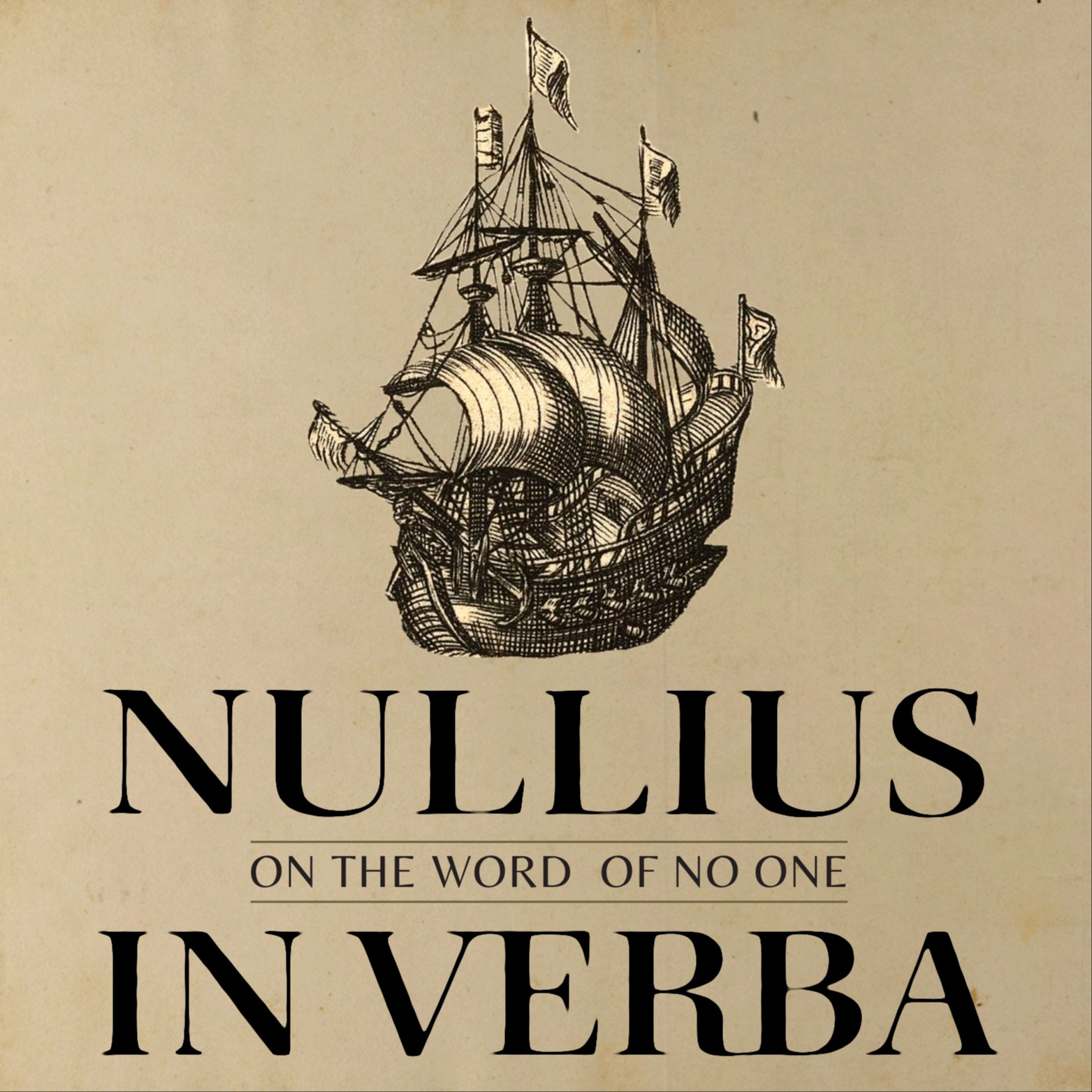

Nullius in Verba
Smriti Mehta and Daniël Lakens
Nullius in Verba is a podcast about science—what it is and what it could be. It is hosted by Smriti Mehta from UC Berkeley and Daniël Lakens from Eindhoven University of Technology. Our logo is an homage to the title page of Novum Organum, which depicts a galleon passing between the mythical Pillars of Hercules on either side of the Strait of Gibraltar. The title of the podcast comes from the motto of the Royal Society, set in typeface Kepler by Robert Slimbach. Our theme song is Newton’s Cradle by Grandbrothers.
Episodes
Mentioned books

Mar 28, 2025 • 20min
Prologus 56: Probability Pyramiding (A. Neher)
In preparation for our discussion of "Why Most Published Research Findings Are False" by John Ioannidis from 2005, we read a very similar paper published 40 years earlier:
Neher, A. (1967). Probability Pyramiding, Research Error and the Need for Independent Replication. The Psychological Record, 17(2), 257–262. https://doi.org/10.1007/BF03393713

Mar 21, 2025 • 1h 4min
Episode 55: Pseudoscientia
In this episode, we discuss what separates science from pseudoscience and touch upon the demarcation problem, the recent controversial podcast called the Telepathy Tapes, and the movie Ghostbusters. Enjoy.
Shownotes
McLean v. Arkansas
Pigliucci, M., & Boudry, M. (Eds.). (2019). Philosophy of pseudoscience: Reconsidering the demarcation problem. University of Chicago Press.
Report of the Royal Commission to Investigate Animal Magnetism
The Telepathy Tapes
Frankfurt, H. G. (2009). On bullshit.
Moberger, V. (2020). Bullshit, pseudoscience and pseudophilosophy. Theoria, 86(5), 595–611.
Ghostbusters (1984) - Venkman's ESP Test Scene

Mar 7, 2025 • 1h 4min
Episode 54: Fabulae Coniurationis
Conspiracy Stories Show Notes:
Zeitgeist documentary: https://en.wikipedia.org/wiki/Zeitgeist_(film_series)
Podcast Drang naar Samenhang: https://podcasts.apple.com/nl/podcast/drang-naar-samenhang/id1584797552
This is not a conspiracy theory documentary. https://www.everythingisaremix.info/tinact
Parker, M. (2000). Human Science as Conspiracy Theory. The Sociological Review, 48(2_suppl), 191-207. https://doi.org/10.1111/j.1467-954X.2000.tb03527.x
Douglas, K. M., Sutton, R. M., & Cichocka, A. (2017). The Psychology of Conspiracy Theories. Current Directions in Psychological Science, 26(6), 538-542. https://doi.org/10.1177/0963721417718261
Tage-gate episode of More of a Comment than a Question: https://moreofacomment.buzzsprout.com/1207223/episodes/5511751-tage-gate

6 snips
Feb 21, 2025 • 51min
Episode 53: Fraus - II
Dive into the murky waters of scientific fraud and the erosion of trust it brings to academia. Explore the balancing act between self-correction in science and the reality of misconduct. Learn about the profound implications of data integrity, illustrated through a darkly humorous anecdote. Discussions on the psychological pressures leading to cheating reveal broader ethical dilemmas. Finally, discover the shifting attitudes towards replication as a vital part of maintaining scientific integrity. Transparency and accountability emerge as essential themes in fostering ethical research practices.

Feb 7, 2025 • 1h 6min
Episode 52: Fraus - I
Dive into the murky world of scientific fraud as hosts unpack infamous hoaxes and data manipulation. They explore Alan Sokol's satirical paper and its implications for academic integrity. Ethical dilemmas arise around practices like p-hacking, raising questions about trust in research. The Diederik Stapel fraud case highlights transparency issues and personal motivations in academia. Personal consequences of fraud are discussed, as are the heavy impacts on families. Accountability in the scientific community remains a pressing theme throughout.

Jan 24, 2025 • 53min
Episode 51: Quinquagesimus - II
In this special two-part celebration, we answer questions submitted by our listeners. Thanks to Don Moore, Leif Nelson, Henry Wyneken, Charlotte Pennington, and Karan Paranganat for the questions featured in this episode. And thank you for joining us for 50 episodes!

Jan 10, 2025 • 1h 4min
Episode 50: Quinquagesimus - I
In this special two-part celebration, we answer questions submitted by our listeners. Thanks to James Steele, Peder Isager, and Simen Leithe Tajet for the questions featured in this episode. And thank you for joining us for 50 episodes!
Shownotes
Roger Scruton Quote
Borsboom, D., Mellenbergh, G. J., & van Heerden, J. (2003). The theoretical status of latent variables. Psychological Review, 110(2), 203–219. https://doi.org/10.1037/0033-295X.110.2.203
Danermark, B., Ekström, M., & Karlsson, J. C. (2019). Explaining Society: Critical Realism in the Social Sciences (2nd ed.). Routledge. https://doi.org/10.4324/9781351017831
Maxwell, J. A., & Mittapalli, K. (2010). Realism as a Stance for Mixed Methods Research. In A. Tashakkori & C. Teddlie, SAGE Handbook of Mixed Methods in Social & Behavioral Research (pp. 145–168). SAGE Publications, Inc. https://doi.org/10.4135/9781506335193.n6
Vincent, S., & O’Mahoney, J. (2017). Critical realism and qualitative research: An introductory overview (G. Grandy, C. Cassell, & A. L. Cunliffe, Eds.; pp. 201–216). SAGE Publications Ltd. https://doi.org/10.4135/9781526430212
Danermark, B. (2019). Applied interdisciplinary research: A critical realist perspective. Journal of Critical Realism, 18(4), 368–382. https://doi.org/10.1080/14767430.2019.1644983

10 snips
Dec 13, 2024 • 1h 9min
Episode 49: Valor Scientiae Psychologicae
You can listen to the podcast More of a Comment Than a Question here: https://moreofacomment.buzzsprout.com/
Our joint episode is a response to the episode ‘Final Final Final Comments’: https://moreofacomment.buzzsprout.com/1207223/episodes/16055645-final-final-final-comments

Dec 6, 2024 • 12min
Prologus 49: We Have to Break Up (R. B. Cialdini)
In preparation for our next episode, a joint recording with our friends from More of a Comment than a Question, we read a paper by Robert Cialdini about the value of social psychology for the general public.
Cialdini, R. B. (2009). We Have to Break Up. Perspectives on Psychological Science, 4(1), 5–6. https://doi.org/10.1111/j.1745-6924.2009.01091.x

15 snips
Nov 29, 2024 • 59min
Episode 48: Defectum
How I Fail. Blog by Veronika Cheplygina https://veronikach.com/category/how-i-fail/
Arkin, R. (2011). Most Underappreciated: 50 Prominent Social Psychologists Describe Their Most Unloved Work. Oxford University Press.
Kerr, N. L. (1998). HARKing: Hypothesizing After the Results are Known. Personality and Social Psychology Review, 2(3), 196–217. https://doi.org/10.1207/s15327957pspr0203_4
Sharpe, D. (2013). Why the resistance to statistical innovations? Bridging the communication gap. Psychological Methods, 18(4), 572–582. https://doi.org/10.1037/a0034177
Anti-Creativity Letters episode: https://nulliusinverba.podbean.com/e/prologus-23-the-anticreativity-letters-r-e-nisbett
Rouder, J. N., Haaf, J. M., & Snyder, H. K. (2019). Minimizing Mistakes in Psychological Science. Advances in Methods and Practices in Psychological Science, 2(1), 3–11. https://doi.org/10.1177/2515245918801915
Firestein, S. (2015). Failure: Why Science Is So Successful (First Edition). Oxford University Press.
Sternberg, R. J. (Ed.). (2019). My Biggest Research Mistake: Adventures and Misadventures in Psychological Research (1st edition). SAGE Publications, Inc.


